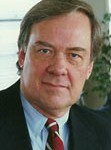I was headed up the elevator for the umpteenth time, this trip to ask my celebrated artist friend to do me a tacky favor. I wasn't sure how it would be received.

Gordon Wetmore had painted portraits of some of the world's most famous people. Richard Nixon, Princess Grace, Norman Vincent Peale. A long list.
A portrait artist is a sole proprietor, a businessman, a risk-taker. You must have talent, as Gordon clearly did. But that is not enough. You must also be a promoter, a salesman, and great at customer service. Gordon was all of these.
He and I connected on the level of being self-employed. The risk aspect, the freedom, the thrill of the reward, the loneliness of having no regular colleagues—we could relate to it all. That last factor was why we both enjoyed getting together so often and catching up. I was running my own news publication when we met in the late 90's hanging out at Greyfriar's coffeeshop downtown at Jack's Alley. Because we worked our own hours, we might find ourselves at Greyfriar's at various times during the day.
I was bringing in one-tenth of his kind of revenue with my investigative reporting enterprise distributed by fax machine. It was all the news that's not fit to print, and Gordon loved reading it. But was he willing to be associated with it? I would find out when I asked him the question I came to deliver that day.
I don't remember our first conversation, but I'm sure it was excellent, because Gordon was a fantastic conversationalist, perhaps the best I've ever known. It doesn't take enormous talent to be a great conversationalist, just great discipline and self-control. Gordon, simply, made it his point to actually be interested in you. He would ask you questions about yourself. Now, a lot of people do that. But Gordon would take it that one step further, a level most people never reach. He would actually be interested in your answer and continue to ask follow up questions until the matter was satisfactorily completed.
Now, I admit it does take a certain amount of talent to be a great conversationalist. You also must have something to say in return. Gordon did. He had fascinating stories to tell and all kinds of insights on life and interesting questions to ponder. But the trick is balance. Gordon never got so caught up in his own interesting material to fail to bounce the ball back to the other person in an appropriate amount of time.
Ironically, Gordon would often chastise himself aloud for talking too much about himself. The truth is, he rarely did. His awareness of the possibility belied his commitment to listening to others first.

So it was time to head up to his studio and ask the question. With two cups of coffee in hand (my ritual whenever visiting him), I pushed the button for the tenth floor of the Chattanooga Bank Building on Broad and 8th Streets. Gordon's office/studio was one floor above the tenth by stairwell. He called it the "Penthouse,"—he always had this touch of class that wasn't too flashy. This 2,000 square foot space at the top of the building had a view of the Aquarium, downtown, and river on one side and a view of Lookout Mountain on the other. A door to the outside allowed you to enjoy the view from a small veranda. Several of his pieces from his books Ireland and The Holy Land graced the walls. Two or three giant easels with portraits in various stages sat in the corners of the studio.
Gordon always manned the back corner and was usually working there when I would pop in, always unannounced. He wouldn't just be willing to stop work and talk with me. He always greeted me with the utmost enthusiasm, a gleam in his eye, and a compliment about my person quickly to follow. This was one of Gordon's great qualities. I'd like to think it was a lot about me, but when others popped in while I was with him, he exhibited that same warm, gracious, affirming manner. With Gordon, people always trumped productivity.
According to dramatists, a great character is determined by a person's dimensions. Dimensions are basically contradictions. Gordon had a few. For instance, there was how he treated Andrew, another of our friends from the coffee shop. Andrew was a caricature artist, tall, with a face that he admitted looks like a caricature itself. At this point in life, Andrew was basically a drifter, thirty years Gordon's junior, and completely out of Gordon's league in terms of income, accomplishments, and notoriety.
But Gordon was fascinated with Andrew. Andrew had a fantastic, innate ability to garner a likeness when he drew his caricatures. (Here's Andrew's caricature of himself.) He could do it starting at age five. Gordon said getting a likeness was a great mystery. He didn't know quite how he did it with his portraits, but he knew when he got a good one.
Of course, Gordon was great at getting a likeness as well. They were both great at it, but that is where this contradiction/dimension of Gordon's kicks in. He easily could have felt competitive toward Andrew. He could have scoffed at him for being a lowly sidewalk caricature man. Instead, he admired the heck out of him and told him so.
But it wasn't just with artists. Of his many traits, I've concluded Gordon's greatest attribute was his willingness to learn. At age 70, he was not just interested, he was downright thirsty for new insights and new ideas. He listened intently and carefully to young and old, sophisticated and common, to add to his accomplishments. Yet, he could have chosen decades earlier to rest on his laurels.
We sat down on his two sofas in the studio, enjoyed some coffee, and had another great Gordon Wetmore conversation. I was ready to ask the question. For my news publication, I always reprinted a national cartoon on the front page. People loved it. But my slant was local, and I wanted to create local lampoons.
"Gordon, would you consider drawing cartoons for my publication?"
It was pretty much assumed I couldn't pay him anything. He thought about it for a minute.
"You know, I get $25,000, sometimes even $50,000, for my signature at the bottom of a drawing," he said. He then noted that I was a fairly controversial figure around town. I had just sued the mayor for failure to disclose public records.
But Gordon loved the truth, and he loved to have fun. He grinned.
"I'll try it," he said. "But you'll just get my initials at the bottom."
That was the first of several hundred cartoons we conspired on together over several years. For the love of a laugh, he put his reputation on the line. But it all worked out. Eventually, the publication grew more respectable, and the city got a new mayor, Bob Corker, who ended up as our U.S. Senator. When Gordon and I published a book of all our local lampoons, Corker himself wrote the foreword.
When I found out last week Gordon had died, I got the news from Andrew. We had both been following the sudden illness on Facebook, but he got the final word before I did and called me from New Orleans where he now lives with his new family. Andrew is devoted to Gordon and to his memory. Like me, he was sad and shocked. Like me, he loved Gordon, because Gordon loved him.
I will write more about Gordon on Wednesday and Thursday.
It takes a genius to herd cats, I mean artists (2nd of 3)Saying Goodbye to a Great Man (3rd of 3)
Gordon Wetmore

